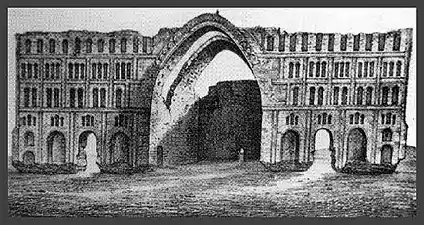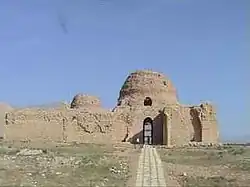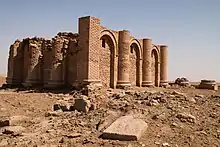The Parthian style is a style (sabk) of historical Iranian architecture defined by Mohammad Karim Pirnia.
This architectural style includes designs from the Seleucid (310–140 BCE), Parthian (247 BCE – 224 CE), and Sassanid (224–651 CE) eras, reaching its apex of development in the Sassanid period.
Examples of this style are Ghal'eh Dokhtar, the royal compounds at Nysa, Anahita Temple, Khorheh, Hatra, the Ctesiphon vault of Kasra, Bishapur, and the Palace of Ardashir in Ardeshir Khwarreh (Firouzabad).[1]
The Parthi style of architecture appeared after Alexander the Great's conquest of the Achaemenid Empire in the 3rd century BCE, and historically includes the Sassanid, Parthian, and post Islamic eras, up to the 9th–10th centuries.[2] The remains of the architectural style of this period are not abundant, and although much was borrowed and incorporated from Greek designs and methods, architects and builders of this age employed many innovative concepts of their own as well.[3]
Gallery
 1824 depiction of Taq-i Kisra by British explorer.
1824 depiction of Taq-i Kisra by British explorer. Anahita Temple Archaeological complex in Kangavar.
Anahita Temple Archaeological complex in Kangavar.

 Temple of Gareus, Uruk
Temple of Gareus, Uruk
See also
References
- ↑ Pīrniyā, Muammah Karīm (2005). Sabk Shināsī-i miʻmārī-i Īrānī (Study of styles in Iranian architecture). Tehran: Surush-i Dānish. ISBN 964-96113-2-0.p.92-93 & p.94-129
- ↑ Fallāḥʹfar, Saʻīd (سعید فلاحفر). The Dictionary of Iranian Traditional Architectural Terms (Farhang-i vāzhahʹhā-yi miʻmārī-i sunnatī-i Īrān فرهنگ واژههای معماری سنتی ایران). Kamyab Publications (انتشارات کامیاب). Kāvushʹpardāz. 2000, 2010. Tehran. ISBN 978-964-2665-60-0 US Library of Congress LCCN Permalink: http://lccn.loc.gov/2010342544 p.44
- ↑ Pīrniyā, Muammah Karīm (2005). Sabk Shināsī-i miʻmārī-i Īrānī (Study of styles in Iranian architecture). Tehran: Surush-i Dānish. ISBN 964-96113-2-0.p.94-96
Further reading
- Pīrniyā, Muammah Karīm (2005). Sabk Shināsī-i miʻmārī-i Īrānī (Study of styles in Iranian architecture). Tehran: Surush-i Dānish. ISBN 964-96113-2-0.
- Kawami, T.; Keall, E. J.; Huff, D.; et al. (1987). "Architecture". Encyclopedia Iranica. Vol. 2. New York: Routledge & Kegan Paul. pp. 326–355.
